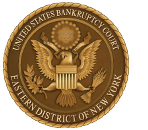THE AUTOMATIC STAY
- The debtor owes me money, can I try and collect the debt?
With a few exceptions, once an individual or business files for bankruptcy, the law imposes a protection called the automatic stay that prohibits most acts of collection against the debtor or the debtor’s property. What does this mean for a creditor? It means that while the debtor is under the protection of the automatic stay, creditors CANNOT for example:• commence or continue lawsuits to collect the debt
• evict a debtor
• communicate with the debtor in any way requesting repayment of the debt
• garnish the debtor’s wages
• repossess property
Attempting to collect a debt from someone who is protected by the bankruptcy stay may result in court action. - Can I ask the court to remove the automatic stay?
Under certain circumstances, a judge will lift the automatic stay to allow creditors to pursue their rights under the law. The creditor must file a motion, pay a fee, and attend a hearing. Specific legal standards must be met to obtain relief from the automatic stay.
DISCHARGE OF DEBT
- What is a discharge and how does it affect me?
If the debtor filed a chapter 7 and no assets are discovered, the debt will be discharged unless it is a debt that cannot be discharged such as child support or student loans. A discharge of debt means that a person is no longer personally obligated to pay it. ONCE A DEBT IS DISCHARGED THERE IS AN INJUNCTION PREVENTING YOU FROM ATTEMPTING TO COLLECT THAT DEBT. Pre-existing liens, however, do remain on the property after discharge. But on request of a debtor, a qualified lien, under certain circumstances may be removed. If the debtor is in a chapter 13 or chapter 11, a claim may be paid through a plan over time. How much of the debt may be paid through the plan depends on the facts of each case.
- Can I object to the discharge of the debt owed to me?
A creditor can object to the dischargeability of a debt or the discharge in its entirety by commencing an adversary proceeding, which is a lawsuit in bankruptcy court. There is a deadline to do this in each case. Only debts meeting certain criteria in the Bankruptcy Code can be excepted from discharge. It is advised that you get legal advice from a qualified attorney to decide if this is a good option for you. Read more about exceptions to discharge.
MEETING OF CREDITORS (341 MEETING)
- What is the 341 meeting of creditors? Must I attend? Can I speak?
The 341 meeting is where the Trustee (NOT THE JUDGE) assigned to the case questions the debtor under oath about the paperwork they submitted and topics such as their finances, income, and assets. Creditors may come and speak when the debtor is being examined. However, a creditor DOES NOT HAVE TO attend the meeting. A creditor’s rights will not be affected if they don’t appear at the meeting.
GENERAL INFORMATION
- How can I receive notices from the court?
If you are not receiving notices about the case you are involved with, you may file a Notice of Appearance. It is a simple form or letter that states who you are, what your role is in the case (for example, a creditor) and the address to where you want notices sent.
- I am a creditor; do I need an Attorney?
An individual creditor may represent him or herself in bankruptcy court without an attorney. But a corporate entity or partnership may not appear in bankruptcy court without an attorney. A proof of claim or a Request for Unclaimed Funds may be filed by an individual, corporate entity, or partnership with or without an attorney.
More Information for Creditors :
